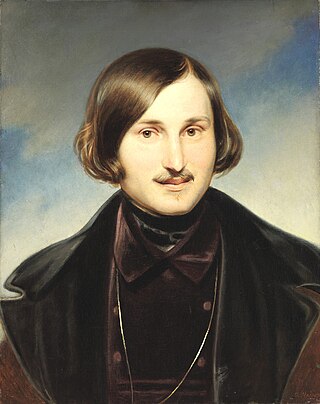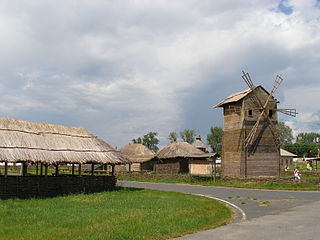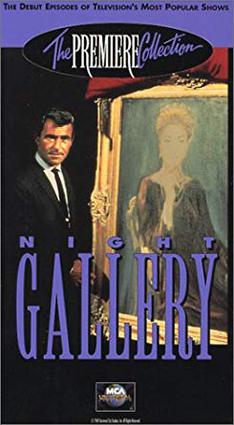Culhwch, in Welsh mythology, is the son of Cilydd son of Celyddon and Goleuddydd, a cousin of Arthur and the protagonist of the story Culhwch and Olwen. In this tale the etymology of Culhwch is explained as "sow run", but this is likely to be folk etymology. According to the narrative, Culhwch is born to his maddened mother Goleuddydd after she is frightened by a herd of swine. The swineherd finds Culhwch in the pigs' run, and takes him back to his father Cilydd. Culhwch is described as being "of gentle lineage".

Nikolai Vasilyevich Gogol was a Russian novelist, short story writer, and playwright of Ukrainian origin.

Night on Bald Mountain, also known as Night on the Bare Mountain, is a series of compositions by Modest Mussorgsky (1839–1881). Inspired by Russian literary works and legend, Mussorgsky composed a "musical picture", St. John's Eve on Bald Mountain on the theme of a Witches' Sabbath occurring at Bald Mountain on St. John's Eve, which he completed on that very night, 23 June 1867. Together with Nikolai Rimsky-Korsakov's Sadko (1867), it is one of the first tone poems by a Russian composer.

The Fair at Sorochyntsi is a comic opera in three acts by Modest Mussorgsky, composed between 1874 and 1880 in St. Petersburg, Russia. The composer wrote the libretto, which is based on Nikolai Gogol's short story of the same name, from his early (1832) collection of Ukrainian stories Evenings on a Farm near Dikanka. The opera remained unfinished and unperformed at Mussorgsky's death in 1881. Today, the completion by Vissarion Shebalin has become the standard.
"The Portrait" is a short story by Russian author Nikolai Gogol, originally published in the short story collection Arabesques in 1835. It is one of Gogol's most demonic of tales, hinting at some of his earlier works such as "St. John's Eve" and "Viy".

"Viy", also translated as "The Viy", is a horror novella by the writer Nikolai Gogol, first published in volume 2 of his collection of tales entitled Mirgorod (1835).

The Legend of the White Snake is a Chinese legend centered around a romance between a man named Xu Xian and a female snake spirit named Bai Suzhen. It is counted as one of China's Four Great Folktales, the others being Lady Meng Jiang, Butterfly Lovers, and The Cowherd and the Weaver Girl.

The Funhouse is a 1980 novelization by American author Dean Koontz, based on a Larry Block screenplay, which was made into the 1981 film The Funhouse, directed by Tobe Hooper. As the film production took longer than expected, the book was released before the film.

Evenings on a Farm Near Dikanka is a collection of short stories by Nikolai Gogol, written in 1829–1832. They appeared in various magazines and were published in book form when Gogol was twenty-two. The collection's frame story takes place in Dykanka, a settlement in central Ukraine.

Velyki Sorochyntsi is a village in Myrhorod Raion, Poltava Oblast, central Ukraine. It formerly had town status. It hosts the administration of Velyki Sorochyntsi rural hromada, one of the hromadas of Ukraine. The village is famous as the birthplace of the writer Nikolai Gogol and the location of the Sorochyntsi Fair. In 1925–1931, the town was called Neronovychi after the Bolshevik activist Yevhen Neronovych, who was executed by Ukrainian military forces in the town in 1918.

"St. John's Eve", also known as "The Eve of Ivan Kupala", is the second short story in the collection Evenings on a Farm Near Dikanka by Nikolai Gogol. It was first published in 1830 in the literary Russian periodical Otechestvennye Zapiski and in book form in 1831.

"May Night, or the Drowned Maiden" is the third tale in the collection Evenings on a Farm Near Dikanka by Nikolai Gogol. It was made into the opera May Night by Nikolai Rimsky-Korsakov in 1878–79 and also a Ukrainian setting by Mykola Lysenko.

"The Lost Letter" (1831) is the fourth Ukrainian tale in the 1832 collection Evenings on a Farm Near Dikanka by Nikolai Gogol.
"Christmas Eve" is the first story in the second volume of the 1832 collection Evenings on a Farm Near Dikanka by Nikolai Gogol.
"Ivan Fyodorovich Shponka and His Aunt" is part of the collection Evenings on a Farm Near Dikanka by Nikolai Gogol.
Mirgorod is a collection of short stories written by Nikolai Gogol, composed between 1832 and 1834 and first published in 1835. It was significantly revised and expanded by Gogol for an 1842 edition of his complete works. The title Mirgorod is the Russian pronunciation of the name of the Ukrainian city Myrhorod and means "city of peace" in both languages. It is also the setting for the final story in the collection, “The Tale of How Ivan Ivanovich Quarreled with Ivan Nikiforovich”. The title reflects the stories’ portrayal of provincial Ukrainian life, similar to Gogol’s successful previous collection, Evenings on a Farm Near Dikanka. To solidify this connection between the two works, he attached the subtitle: “Stories which are a continuation of the Evenings on a Farm Near Dikanka.”
"The Tale of How Ivan Ivanovich Quarreled with Ivan Nikiforovich", also known in English as The Squabble, is the final tale in the Mirgorod collection by Nikolai Gogol. It is known as one of his most humorous stories.

This is a list of the works by Nikolai Gogol (1809–1852), followed by a list of adaptations of his works:

Night Gallery is a 1969 American made-for-television anthology supernatural horror film starring Joan Crawford, Roddy McDowall and Richard Kiley. Directed by Boris Sagal, Steven Spielberg and Barry Shear, the film consists of three supernatural tales that served as the pilot for the anthology television series of the same name, written and hosted by Rod Serling. Serling garnered the Edgar Award for Best TV Episode for this effort. The film premiered on NBC on November 8, 1969.

Gogol. The Beginning is a 2017 Russian fantasy-horror film directed by Yegor Baranov loosely based on works by Nikolai Gogol from the 1832 collection Evenings on a Farm near Dikanka. The title role is played by Alexander Petrov.














